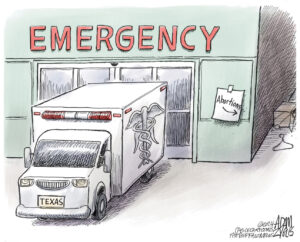Partisan Politics Wait in the Wings
Beneath the warm pledges of bipartisanship and the earnest calls for cooperation lurks an unpleasant fact: From the moment it loses power, the opposition party turns to the task of getting it back.Beneath the warm pledges of bipartisanship and the earnest calls for cooperation in the midst of a grave crisis lurks an unpleasant fact: From the moment it loses power, the opposition party turns to the task of getting it back.
Party politics have not been suspended. They have just become more subtle. Republicans are already busy testing lines of attack against President Barack Obama and laying down markers that will allow them to say they warned us — if Obama fails.
In the meantime, Obama is already countering with quiet moves to broaden his own political coalition. When opponents of abortion rallied in Washington’s streets last week, Obama did not offer a simple restatement of his support for abortion rights.
Instead, his first response to the subject as president coupled his support for legal abortion with a call for “common ground.” He urged action “to prevent unintended pregnancies, reduce the need for abortion, and support women and families in the choices they make.”
The consensual tone on a divisive issue reflected intense behind-the-scenes lobbying by religious supporters of Obama who urged him to avoid a direct rebuke to social conservatives. His willingness to do so suggests that he intends to continue his campaign’s efforts to poach on once reliably Republican constituencies.
Republicans are divided over how aggressively to take Obama on. This is the new president’s greatest advantage over Bill Clinton, who faced fierce GOP attacks from the day he took office.
It was easier to discount Clinton’s 1992 victory, based on 43 percent of the popular vote, than it is to deny the import of Obama’s solid majority. Republicans actually gained ground in Congress the year Clinton was first elected. Now, they are coming off stinging congressional defeats in two consecutive elections.
On Friday, Gallup released a report that’s devastating to the GOP. The survey, based on 30,000 interviews over the course of the year, found that in 2008 an average of 36 percent of Americans identified themselves as Democrats and only 28 percent called themselves Republicans. Gallup noted that this was the largest advantage of the Democratic Party in more than two decades.
For some Republicans, these numbers counsel short-term prudence and suggest the need for at least a semblance of cooperation with Obama, whose personal popularity is soaring. Former Rep. J.C. Watts, once a member of the House Republican leadership, cautions his party: “Be careful how you throw eggs at this parade.” In Congress, this approach is reflected in the efforts of some Republicans to alter but not oppose Obama’s economic stimulus package.
But in what might be seen as a GOP good cop/bad cop division of labor, others in the party are already savaging Obama and his plans.
The most insidious line of attack involves laying the groundwork for blaming the new president in the event of a terrorist attack.
In a remarkably partisan Op-Ed piece in The Washington Post last Thursday, Marc A. Thiessen, who was a speechwriter for George W. Bush, declared flatly: “If Obama weakens any of the defenses Bush put in place and terrorists strike our country again, Americans will hold Obama responsible — and the Democratic Party could find itself unelectable for a generation.”
This is dangerous, both substantively and politically, and it suggests that some of Bush’s loyalists will continue to politicize issues related to terrorism in their efforts to vindicate the former president’s legacy.
Less controversial are criticisms of the stimulus package, still taking shape. Here, Republicans are torn between those focused on making the plan more palatable to conservative sensibilities and those offering root-and-branch criticisms of its emphasis on new spending.
Typical of the second approach was a recent assault by Rep. Jeb Hensarling, R-Texas, on the proposal. “This isn’t a bill to help the economy,” Hensarling said recently on CNBC. “It’s a bill to help big government,” a response to “14 years of pent-up demand for big government programs.” He warned that the package would simply mimic a flawed stimulus strategy pursued by Japan a decade ago.
Both Thiessen and Hensarling reflect an important undercurrent in Republican thinking: that the GOP should place its bets on the prospect that Obama’s policies will fail, knowing that if the president succeeds, he and the Democrats are likely to gain ground no matter what Republicans do. This is hardly in keeping with the bipartisan spirit the White House seeks to foster. But it’s a lot easier than coming up with new ideas.
E.J. Dionne’s e-mail address is postchat(at)aol.com.
© 2009, Washington Post Writers Group
Your support matters…Independent journalism is under threat and overshadowed by heavily funded mainstream media.
You can help level the playing field. Become a member.
Your tax-deductible contribution keeps us digging beneath the headlines to give you thought-provoking, investigative reporting and analysis that unearths what's really happening- without compromise.
Give today to support our courageous, independent journalists.









You need to be a supporter to comment.
There are currently no responses to this article.
Be the first to respond.